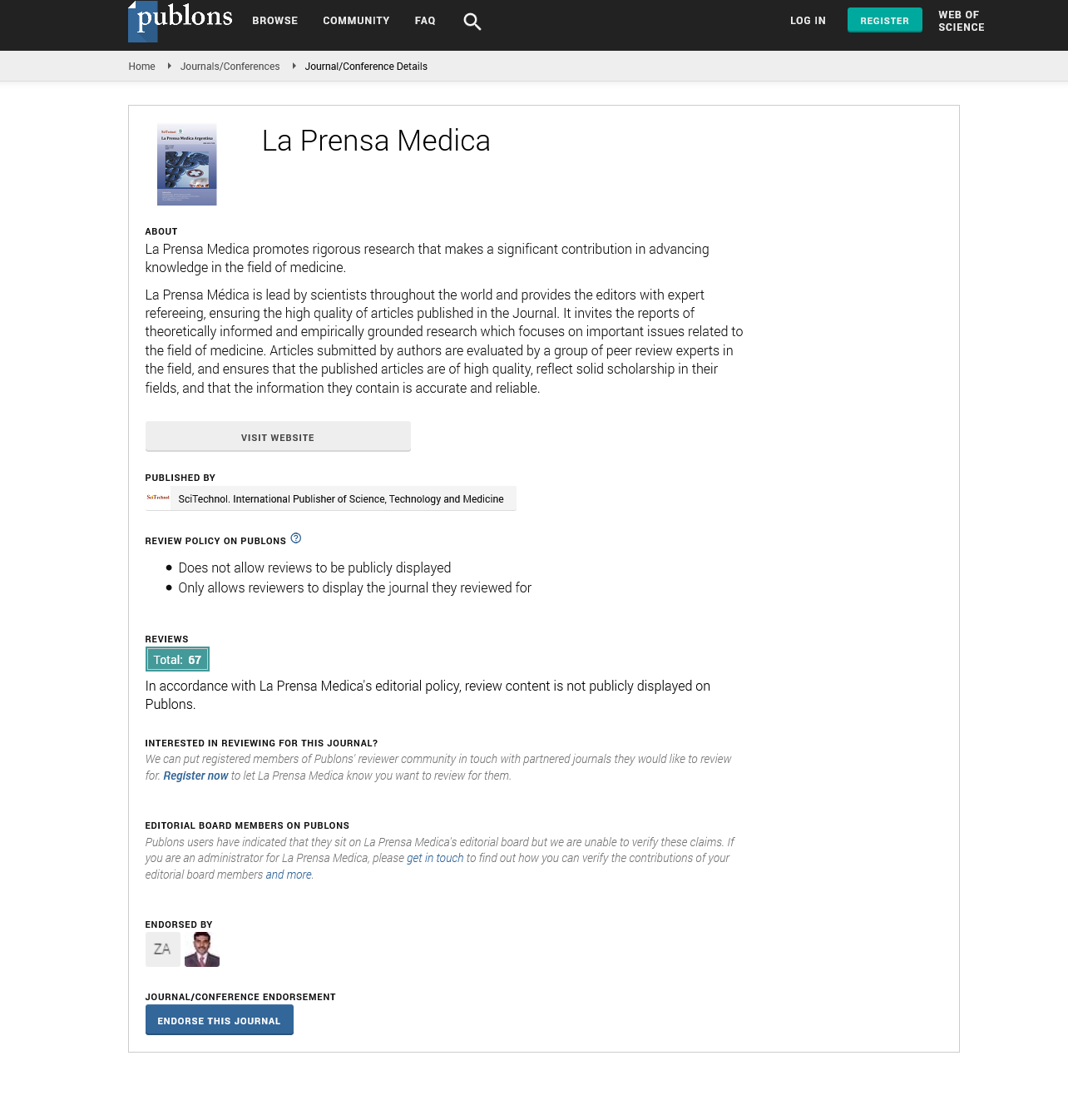Perspective, La Prensa Medica Vol: 109 Issue: 4
Overview of Rheumatology and Autoimmune Challenges
Angela Roulte*
1Department of Medicine, Addenbrooke's Hospital, Hills Road, Cambridge, United Kingdom
*Corresponding Author: Angela Roulte,
Department of Medicine, Addenbrooke's
Hospital, Hills Road, Cambridge, United Kingdom
E-mail: roulte89@cam.ac.uk
Received date: 30 October, 2023, Manuscript No. LPMA-23-111740;
Editor assigned date: 01 November, 2023, PreQC No. LPMA-23-111740 (PQ);
Reviewed date: 16 November, 2023, QC No. LPMA-23-111740;
Revised date: 23 November, 2023, Manuscript No. LPMA-23-111740 (R);
Published date: 30 November, 2023, DOI: 10.4172/2324-8955.1000683
Citation: Roulte A (2023) Overview of Rheumatology and Autoimmune Challenges. La Prensa Medica 109:4.
Abstract
Rheumatology, a specialized branch of medicine, delves into the intricate branch of autoimmune disorders that affect the musculoskeletal system and beyond. These disorders, characterized by the immune system's misdirected attacks on the body's own tissues, can lead to a wide spectrum of symptoms and challenges.
Description
Rheumatology, a specialized branch of medicine, delves into the intricate branch of autoimmune disorders that affect the musculoskeletal system and beyond. These disorders, characterized by the immune system's misdirected attacks on the body's own tissues, can lead to a wide spectrum of symptoms and challenges. As we embark on a journey into the world of rheumatology, we uncover the mysteries behind these conditions and the innovative approaches aimed at improving patients' lives.
The immune system's intricacies
Autoimmune disorders, at their core, involve a glitch in the immune system's surveillance mechanism. Instead of safeguarding the body, immune cells target healthy tissues, triggering inflammation and damage. Rheumatology focuses on deciphering the underlying causes of these immune system mishaps and finding ways to restore harmony. While rheumatology is often associated with joint-related issues, autoimmune disorders can affect various body systems. From joints and muscles to skin, blood vessels, and organs, these conditions exhibit a wide-ranging impact that requires a comprehensive approach to diagnosis and treatment.
The challenge of diagnosis
Diagnosing autoimmune disorders in rheumatology is a complex puzzle. Symptoms can be nonspecific and mimic other conditions, leading to delays in accurate diagnosis. Rheumatologists employ a combination of clinical assessment, imaging, and lab tests to piece together the puzzle and tailor treatment plans to individual needs. Inflammation is a hallmark of autoimmune disorders. Chronic inflammation not only causes pain and discomfort but can also lead to tissue damage over time. Rheumatologists work to identify and manage the underlying inflammatory processes to prevent further harm.
Innovations in treatment
The landscape of rheumatology treatment has seen remarkable advancements in recent years. Targeted therapies, including biologic drugs and Disease-Modifying Ant Rheumatic Drugs (DMARDs), aim to dampen the immune response and halt the progression of autoimmune disorders. These treatments offer newfound hope and improved quality of life for patients.
Lifestyle and self-management
Beyond medical interventions, rheumatology emphasizes the role of lifestyle changes and self-management in controlling symptoms. Exercise, proper nutrition, and stress management play pivotal roles in minimizing inflammation and optimizing overall well-being.
Holistic patient-centered care
Rheumatology places a strong emphasis on patient-centered care. Recognizing the individuality of each patient's experience, rheumatologists collaborate with patients to develop tailored treatment plans that consider their unique needs, preferences, and goals.
Emerging research frontiers
Research in rheumatology continues to explore the underlying mechanisms of autoimmune disorders. Genetic factors, environmental triggers, and the gut microbiome are areas of active investigation that hold promise for unraveling the mysteries behind these complex conditions.
Pediatric rheumatology
Autoimmune disorders aren't exclusive to adults; children can also be affected. Pediatric rheumatologists specialize in diagnosing and managing these conditions in children, ensuring that young patients receive appropriate care and support.
Patient advocacy and support
Rheumatology extends beyond medical consultations. Patient advocacy groups and support networks play a vital role in providing resources, information, and a sense of community for individuals navigating the challenges of autoimmune disorders.
Conclusion
The field of rheumatology exemplifies the collaborative nature of modern medicine. Rheumatologists often work closely with other specialists, including orthopedic surgeons, physical therapists, and occupational therapists, to provide comprehensive care that addresses all aspects of a patient's well-being. Rheumatology is a multifaceted realm that delves into the complexities of autoimmune disorders. From the immune system's intricate workings to innovative treatments and holistic patient care, rheumatology strives to improve the lives of those affected by these conditions.
 Spanish
Spanish  Chinese
Chinese  Russian
Russian  German
German  French
French  Japanese
Japanese  Portuguese
Portuguese  Hindi
Hindi 

